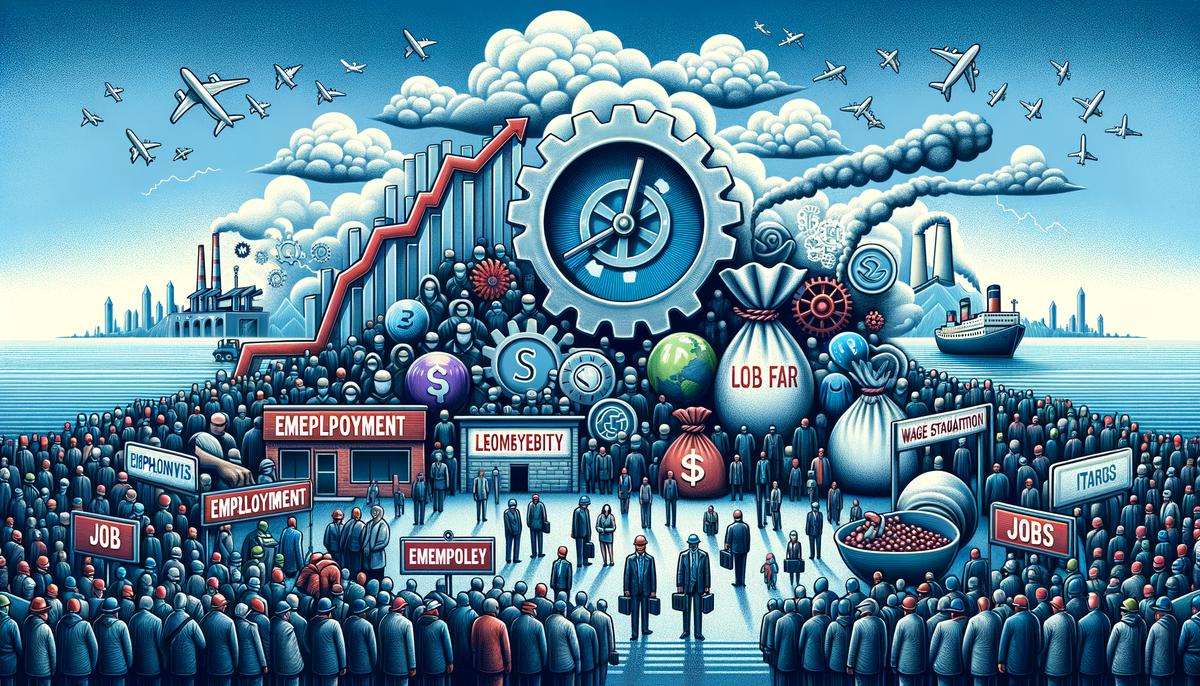
UK Recession Alert
Economic Indicators
Consumer confidence in the UK has seen a downward trend since mid-2021, with a small uplift towards the end of 2022. This shift suggests that people are increasingly worried about their financial situation and the broader economic conditions. When people feel uncertain about the future, they tend to cut back on spending, directly impacting the retail sector and beyond.
Recent statistics revealed a 5.7% fall in retail sales in the three months leading up to December 2022 compared to the same period the previous year.[1] This decline demonstrates that consumers are tightening their belts, largely due to rising prices and concerns over affordability. High street shops feel the impact as shoppers become more cautious, indicating stress on one of the economy’s most visible sectors.
Business output is slowing down. The manufacturing and service industries have both reported declines in output. For instance, manufacturing output dropped by 1.2% between September and November 2022 when compared with the previous three months.[2] Such downturns in production signal challenges for the economy’s health, showing that businesses face difficult times.
Nevertheless, there’s a glimmer of hope as businesses have shown more optimism at the start of January than in the previous eight months. This uptick, likely fueled by easing cost pressures and falling energy prices, highlights the fluid and complex nature of economic conditions. Despite this slight optimism from businesses, the overall trend across several indicators illustrates a challenging environment.
The labour market shows both strength and weaknesses. While there has been an increase in employment, real earnings continue to fall when adjusted for inflation, meaning people’s wages aren’t keeping up with rising living costs. The decline in real wages puts additional pressure on consumer spending, creating a cycle that potentially dampens economic recovery prospects.
Analysts predict that these economic challenges put the UK at risk of slipping into a recession. This outlook is partly based on anticipated tighter policies around energy pricing, higher taxes for high earners, and forecasts of rising interest rates. Such fiscal tightening could reduce disposable income further and slow economic activity.
Specific policies, such as the recent US climate-related actions, stir concern over potential impacts on green investments in the UK. With substantial funds directed to climate and clean energy programs requiring domestically sourced goods and services in the US, there are fears that investments might be diverted from the UK, potentially impacting future economic growth.
Several indicators point to a potential recession in the UK. From falling consumer confidence and retail sales to sluggish business output and concerns over inflation and green investments, these factors collectively paint a picture of an economy facing various challenges as it navigates through an uncertain period.

Labour Market Trends
As the UK’s economic landscape grows increasingly complex, the labour market becomes a critical area for scrutiny. It holds significant indications of the economy’s overall health and resilience in the face of prevailing financial pressures. The labour market, with its blend of contradictions – strength in employment rates yet fragility due to real wage decreases and job vulnerabilities – paints a nuanced picture of the UK’s economic scenario.
Employment rates in the UK have shown an interesting trend. Despite broader economic downturns, employment has risen both in the last quarter and year-on-year, albeit still lagging behind pre-pandemic levels by around 203,000.[3] This uptick in employment suggests a certain degree of resilience within the UK workforce. Businesses, it seems, are still keen to retain and even recruit staff, possibly in anticipation of an eventual economic upswing. However, beneath this seemingly positive facade lies a complex tale of wage stagnation and job insecurity.
The growth in nominal wages, at a first glance, seems promising, running at 6.4% including bonuses in the three-month period up to November 2022.[4] Yet, the positive outlook falls flat when the impact of inflation is accounted for. Real wages, when adjusted for the consumer price index, have trailed behind, decreasing by 3.8% annually. This gap signifies that while nominal pay packets might look healthier, in reality, individuals’ purchasing power has diminished. Workers are squeezed between static or decreasing real incomes and increasing costs of living, from housing to food and energy.
This stagnation and fall in real wages are critical factors dampening consumer confidence and spending. As individuals feel the pinch, their tightened purse strings translate into reduced consumption, hitting sectors reliant on discretionary spending hardest. Retail, leisure, and services feel the immediate effects, but the ripples extend through the entire economy, contributing to concerns about potential recessionary conditions.
Job vacancies started to plateau and even decrease from previously record highs – signalling a cautious or perhaps saturating response to the demand for labour. While the job market appeared robust just a year ago, filled with opportunities and growing vacancies, it now navigates through a cautiously optimistic or even apprehensive patch. This shift underscores businesses’ response to uncertain economic projections and possibly bracing for tighter conditions.
Of noteworthy concern is the increase in redundancies, with numbers ticking up recently by around 30,000.[5] Although unemployment rates remain relatively low at 3.7% as per the latest statistics, the growth in redundancies might signal a forthcoming change. It’s a precarious balancing act for the economy— maintaining employment rates while facing inflation-driven cost pressures and real wage shrinkage.
The UK labour market stands at a crossroads, balancing cautious optimism against uncertainty. Employment rates offer a hopeful glimmer, yet undercurrents of wage suppression and redundancy fears mirror broader economic concerns. As these labour trends continue to evolve, their impact on consumption patterns, consumer confidence, and overall economic vitality cannot be underestimated. With increasing worries of a potential recession, how the labour market adapts and reacts might serve as an indicator for the broader economic future of the UK. In times like these, it becomes crucial for policymakers, businesses, and individuals to navigate with foresight, preparedness, and resilience. The concurrent strength and susceptibility present within the UK labour market underscore the delicate balance between maintaining employment and fostering robust wage growth – a balance that will be pivotal in determining the trajectory of the economy in these challenging times.

Inflation and Interest Rates
In the United Kingdom, another pressing issue within the economic landscape is inflation and interest rates. The nation finds itself navigating the challenges of high inflation rates and the consequential adjustments in interest rates by the Bank of England. These financial factors play a significant role in the prospect of economic stability and the potential risk of a recession. Understanding their impact sheds light on the path forward and brings into focus the complex interplay that could dictate the UK’s economic future in these uncertain times.
Recently, the UK’s inflation rate has been persistently high. The transition from an 11.1% high in October down to a 10.5% level in December, while a slight improvement, still leaves the pound’s purchasing power significantly diminished.[6] This persistently high inflation rate is more than a statistical concern; it is a tangible pressure felt by households across the country.
The Governor of the Bank of England opted for a strategy that would adjust monetary policy in response to this inflationary pressure – incrementing interest rates. December saw rates climb to 3.5%, a significant move aimed to address the high inflation.[7] Predictions in early February suggest a potential additional increase of 0.5%. This action is a calculated measure to counteract stubbornly high inflation, adopting a stance that while inflation might have peaked, vigilance is necessary.
This hike in interest rates presents both benefits and challenges for the economy. On one hand, higher rates are a conventional tool to combat high inflation, designed to cool down excessive spending by making borrowing more expensive and saving more attractive. Yet, on the other hand, it can potentially slow economic growth. Higher rates can burden those with loans and mortgages, dampen business investment, and reduce consumer spending. The balancing act between curbing inflation without stifling growth is a delicate one.
The crucial question arises: How does the interplay between inflation and interest rates affect the probability of a recession?
- High inflationary pressure, if left unchecked, can destabilize the economy and lead to imbalances.
- Adjusting interest rates aims to manage this pressure. However, this action itself introduces a risk of slowing economic activity to the point of potentially triggering a recession.
Adding to this challenge is the issue of wage growth and employment levels. With nominal wages struggling to keep up with inflation, household incomes are strained to cover essential expenses, limiting discretionary spending. This inherent constraint on demand can lead to reduced business revenues, potentially resulting in cost-cutting measures that further impact employment levels and contribute to recessionary conditions as fewer people have disposable income.
However, there is still hope. The possibility of decreased interest rates in the future could potentially steer the economy away from a recession. By providing more affordable borrowing and encouraging investment and consumption, it might counteract the current economic headwinds and help the UK economy avoid a recession.
Inflation and interest rates significantly influence the UK’s economic outlook. Their interplay will determine whether the nation continues along a path of measured optimism or faces the risk of a recession. As history has shown, the UK’s resilience and adaptability could be the key factors in navigating these challenging times and maintaining stability in the face of economic uncertainty.

Government and Monetary Policy
The UK government and the Bank of England are working to address economic uncertainty, aiming to manage inflation, encourage economic growth, and prevent a recession. Their tools include fiscal policies and adjustments to monetary policy, designed to guide the British economy.
The government’s recent actions signify efforts to address multiple economic threats. Increased public spending aims to support economic activity and ensure the continuation of public services and infrastructure developments. Tax adjustments provide some relief while maintaining fiscal responsibility.
The Bank of England has responded to inflationary pressure by adjusting interest rates. These changes impact home mortgages, consumer loans, and business investments. The governor must carefully consider the timing and magnitude of these adjustments to avoid stifling economic growth.
Both entities are working to balance the risks of recession with the need for economic stability. The government’s fiscal support and the Bank’s monetary policy are tools used to foster prosperity while allowing flexibility to adapt to unforeseen challenges.
Tax cuts, expenditure on large projects, and incentives for business investments are designed to promote growth, encourage entrepreneurship, and maintain economic activity. Calculated increases in interest rates aim to control inflation without excessively dampening economic activity.
Balancing inflation control and growth stimulation amidst global uncertainty is a delicate task. Excessive austerity measures could lead to a recession, while being too lenient could result in high inflation.
The government and Bank of England are working to create a supportive environment for Britain’s economy through policy crafting and monetary management. Their actions have real consequences for households and businesses across the country. As they navigate these challenges, their insights and steady leadership are crucial to maintaining Britain’s prosperity in these difficult times.

Global Influences
Britain’s economy is significantly influenced by global events, including financial, political, and socio-economic factors. These international affairs can increase the risk of recession in the country.
Global trade tensions pose a significant challenge. When nations engage in disputes over tariffs and trade barriers, it affects not only the directly involved parties but also has ripple effects worldwide. As an island nation known for its economic diplomacy, the United Kingdom is particularly vulnerable to disruptions in trade flows. The impact of Brexit negotiations and spillovers from U.S.-China trade disputes can hinder British exports and imports, increasing the risk of recession.
In addition to trade issues, global conflicts can have a substantial impact on the UK economy. Wars and unrest in foreign countries can destabilize financial markets, disrupt supply chains, and affect energy supplies. The UK’s industrial and financial sectors are interconnected with global economies, and conflicts abroad can negatively impact markets at home. The combination of rising energy costs and cautious investors due to global conflicts could contribute to the risk of a recession.
Furthermore, the threat of global pandemics, such as the COVID-19 crisis, has demonstrated the close link between global health and economic stability. For Britain, future global health crises have the potential to hinder recovery efforts, disrupt trade routes, and influence consumer confidence. Public health challenges highlight the interdependence of global well-being and economic vitality.
Trade tensions, geopolitical conflicts, and global health crises are all factors that tie Britain to the global economy. As these issues develop, they can increase the risk of the UK economy experiencing a recession. Navigating these challenges requires prudent decision-making, far-sighted diplomacy, and preparation to withstand global economic upheavals.
While Britain may consider its economic fate within the context of its own borders, it remains a significant player in the global economy. By acknowledging this role and preparing to address the impact of international events, Britain can work to avoid a recession and strive for long-term prosperity in the face of global challenges.

Sector-Specific Impacts
As Britain navigates economic uncertainty, the retail, manufacturing, and services sectors face particular challenges. These sectors are crucial to the economy but are vulnerable to the threats of a recession.
The retail sector, a vital part of the economy, faces difficulties as the risk of recession looms. With declining consumer confidence, shoppers are more cautious about spending. Retailers, from large chains to small boutiques, are offering discounts and promotions to attract customers.
Many retailers are also turning to e-commerce to adapt to changing consumer behavior. However, online competition is fierce, and profit margins can be slim.
The manufacturing sector is also facing challenges as the economy slows down. Supply chain disruptions and increasing costs are putting pressure on manufacturers’ profitability.
Brexit has created additional uncertainty for manufacturers, as changes in trade agreements and tariffs can impact continental commerce. Manufacturers must decide whether to invest in innovation or focus on cost-cutting measures to weather the economic downturn.
The rapid pace of digital transformation is another factor influencing the manufacturing sector. Automation and artificial intelligence offer potential solutions but also raise questions about the future of jobs in the industry.
The services sector, which includes finance, hospitality, and professional services, is also navigating the challenges of a potential recession. As economic activity slows, demand for services can decline, affecting businesses in this sector.
The impact of past lockdowns during the COVID-19 pandemic continues to affect the services sector, particularly in hospitality, culture, and leisure. Even the financial sector, typically more resilient, is closely monitoring market volatility and economic indicators.
However, the services sector also has opportunities for adaptation and innovation. Remote work and digital service delivery have become more prevalent, presenting new possibilities for businesses to reach customers and optimize operations.
The retail, manufacturing, and services sectors face significant challenges as the UK economy navigates the risk of recession. While these sectors are vulnerable to economic downturns, they also have the potential for innovation and adaptation. By embracing change and finding creative solutions, businesses in these sectors can work to overcome the difficulties posed by a recession and contribute to the UK’s overall economic recovery.

Amidst the economic uncertainties and sector-specific challenges, the UK’s economy must rely on its resilience and adaptability. The spirit of innovation that has historically guided Britain through difficult times will be crucial in determining the path towards economic stability and growth.
Consider the following:
- The UK has weathered economic storms in the past, demonstrating remarkable resilience and the ability to adapt to changing circumstances.1
- Innovation, a hallmark of the British spirit, has been a driving force behind economic recovery and growth in previous challenging times.2
- The UK’s diverse economic landscape, spanning various sectors, provides a measure of stability and the potential for cross-sector collaboration and support.3
As the nation navigates the current economic climate, it is essential to learn from past experiences and leverage the inherent strengths of the economy. Fostering a culture of innovation, supporting businesses across sectors, and promoting adaptability will be key to overcoming the challenges and building a stronger economic future.
The path forward may be difficult, but with a commitment to resilience and a focus on innovation, the UK can navigate the challenges and emerge stronger. The spirit of Britain, shaped by adversity and driven by ingenuity, will serve as a guide in the pursuit of economic stability and prosperity.

Share
Facebook
X
LinkedIn
Telegram
Tumblr
WhatsApp
VK
Mail